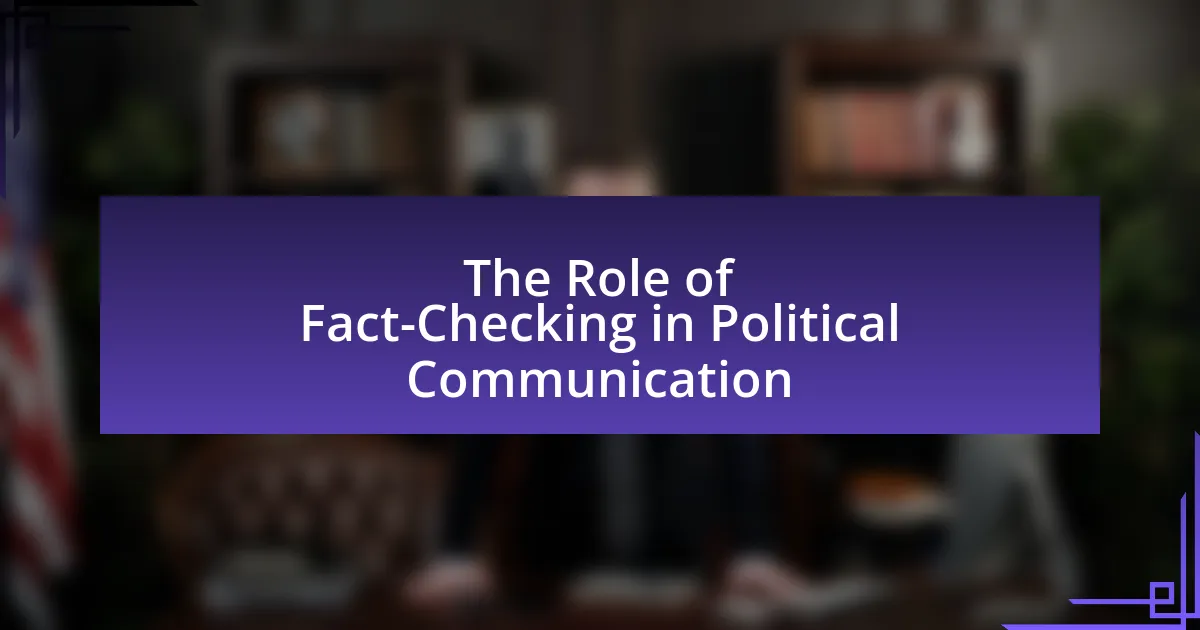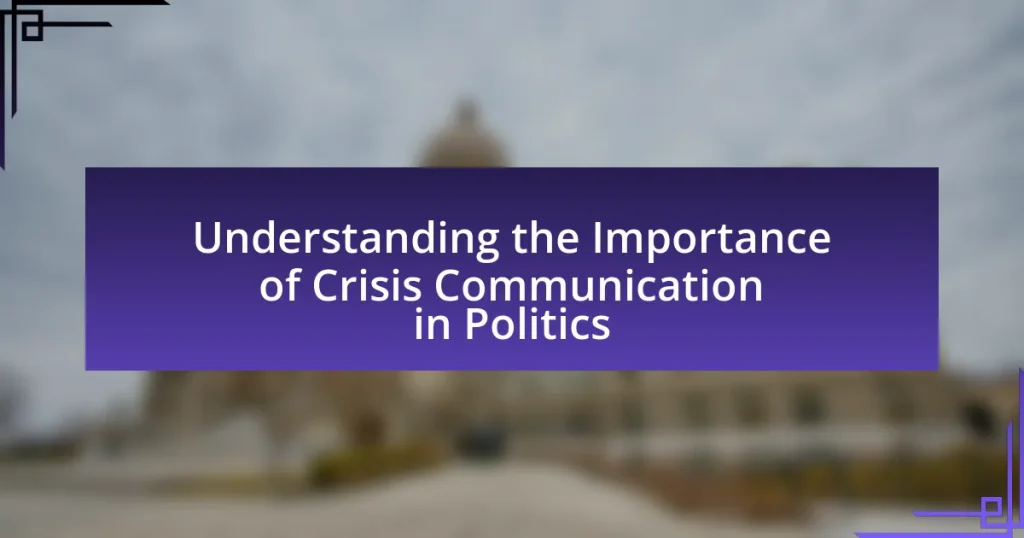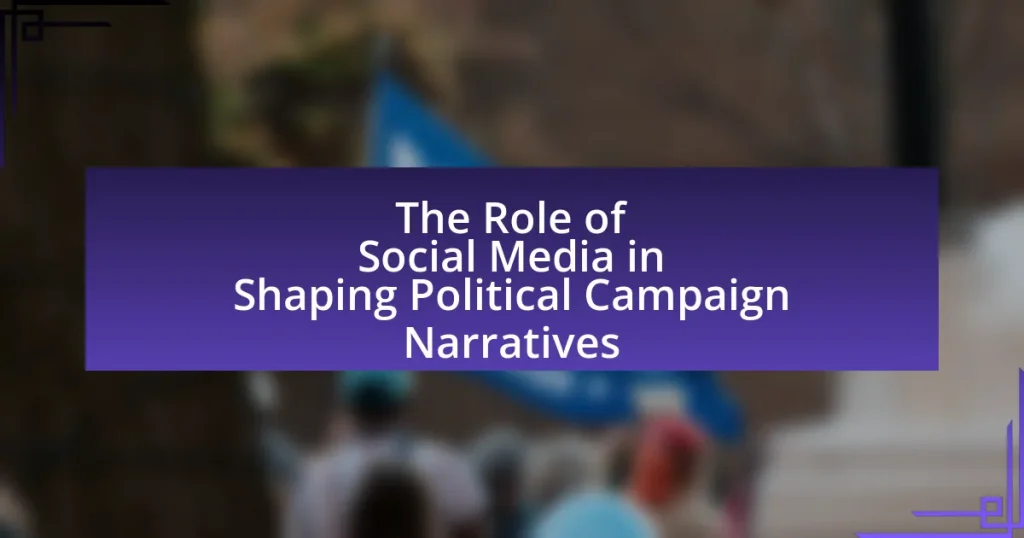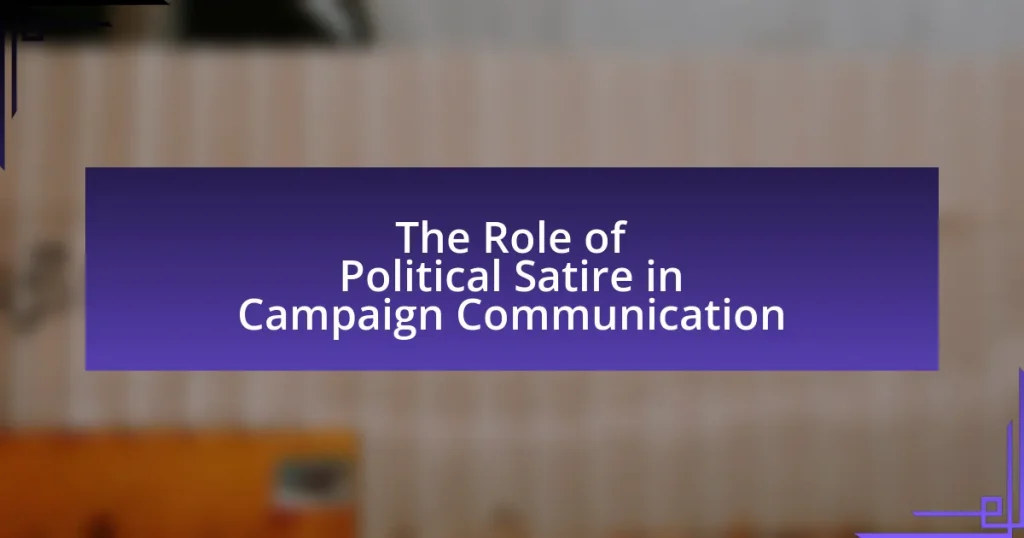The article examines the critical role of fact-checking in political communication, emphasizing its importance in verifying the accuracy of statements made by politicians and public figures. It highlights how fact-checking combats misinformation, promotes informed citizenship, and enhances accountability among political leaders. Key principles of effective fact-checking, such as accuracy, transparency, and accountability, are discussed, along with the methods used to verify claims and the technologies that assist in this process. The article also addresses the challenges faced by fact-checkers, including biases and political pressures, while outlining best practices to improve the effectiveness and credibility of fact-checking efforts in modern politics.
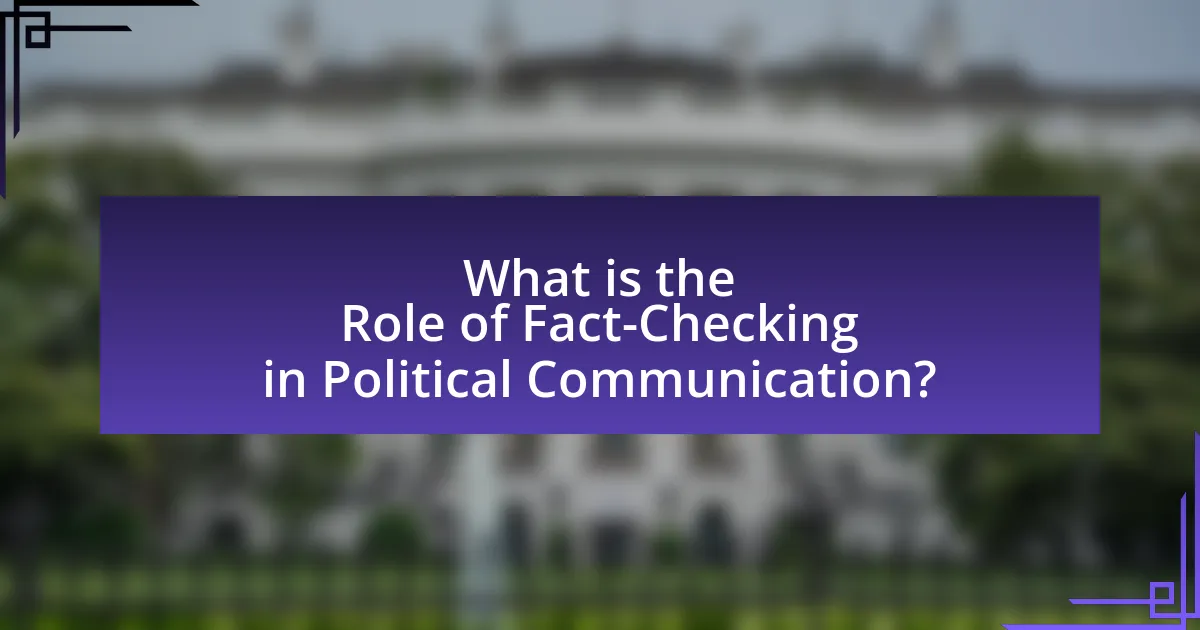
What is the Role of Fact-Checking in Political Communication?
Fact-checking plays a crucial role in political communication by verifying the accuracy of statements made by politicians and public figures. This process helps to combat misinformation, ensuring that the public receives reliable information that can influence their opinions and decisions. According to a study published in the journal “Political Communication,” fact-checking can significantly reduce the impact of false claims on public perception, thereby promoting informed citizenship and accountability among political leaders.
How does fact-checking influence political discourse?
Fact-checking significantly influences political discourse by promoting accountability and reducing misinformation. When fact-checkers assess the accuracy of political statements, they provide voters with reliable information, which can shape public opinion and influence electoral outcomes. For instance, a study by the Pew Research Center found that 62% of Americans believe fact-checking helps them understand political issues better. This increased awareness can lead to more informed discussions and debates among citizens, ultimately fostering a healthier democratic process.
What are the key principles of effective fact-checking?
The key principles of effective fact-checking include accuracy, transparency, and accountability. Accuracy ensures that the information verified is correct and based on reliable sources, which is crucial in maintaining credibility. Transparency involves clearly stating the sources and methods used in the fact-checking process, allowing others to verify the findings independently. Accountability requires fact-checkers to take responsibility for their work, correcting any errors promptly and openly. These principles are essential for fostering trust in the fact-checking process, especially in the context of political communication, where misinformation can significantly impact public opinion and democratic processes.
How does fact-checking impact public perception of political messages?
Fact-checking significantly influences public perception of political messages by enhancing credibility and reducing misinformation. When fact-checking organizations verify claims made by politicians, they provide the public with accurate information, which can lead to a more informed electorate. Studies, such as one conducted by the Pew Research Center, indicate that individuals exposed to fact-checked information are more likely to adjust their opinions based on the verified facts, demonstrating a direct correlation between fact-checking and shifts in public perception. Furthermore, fact-checking can diminish the impact of false claims, as evidenced by research showing that misinformation is less likely to be believed when countered by credible fact-checking sources.
Why is fact-checking essential in modern politics?
Fact-checking is essential in modern politics because it ensures the accuracy of information disseminated to the public, thereby fostering informed decision-making among voters. In an era where misinformation can spread rapidly through social media and other platforms, fact-checking serves as a critical tool to verify claims made by politicians and political entities. For instance, a study by the Pew Research Center found that 64% of Americans believe that fact-checking helps them understand political issues better. This highlights the role of fact-checking in promoting transparency and accountability in political discourse, ultimately strengthening democratic processes.
What role does fact-checking play in combating misinformation?
Fact-checking plays a crucial role in combating misinformation by verifying the accuracy of claims made in public discourse. This process helps to identify falsehoods and provide the public with reliable information, thereby reducing the spread of misleading narratives. Research from the Pew Research Center indicates that fact-checking can significantly influence public perception, as individuals exposed to fact-checked information are more likely to correct their misconceptions. Additionally, fact-checking organizations, such as PolitiFact and FactCheck.org, have demonstrated that their efforts lead to increased accountability among public figures and media outlets, fostering a more informed citizenry.
How does fact-checking contribute to informed voter decision-making?
Fact-checking enhances informed voter decision-making by providing accurate information that counters misinformation and clarifies political claims. When voters access verified facts, they can critically evaluate candidates’ statements and policies, leading to more educated choices at the polls. Research from the Pew Research Center indicates that 64% of Americans believe fact-checking helps them understand political issues better, demonstrating its significant impact on voter awareness and engagement.
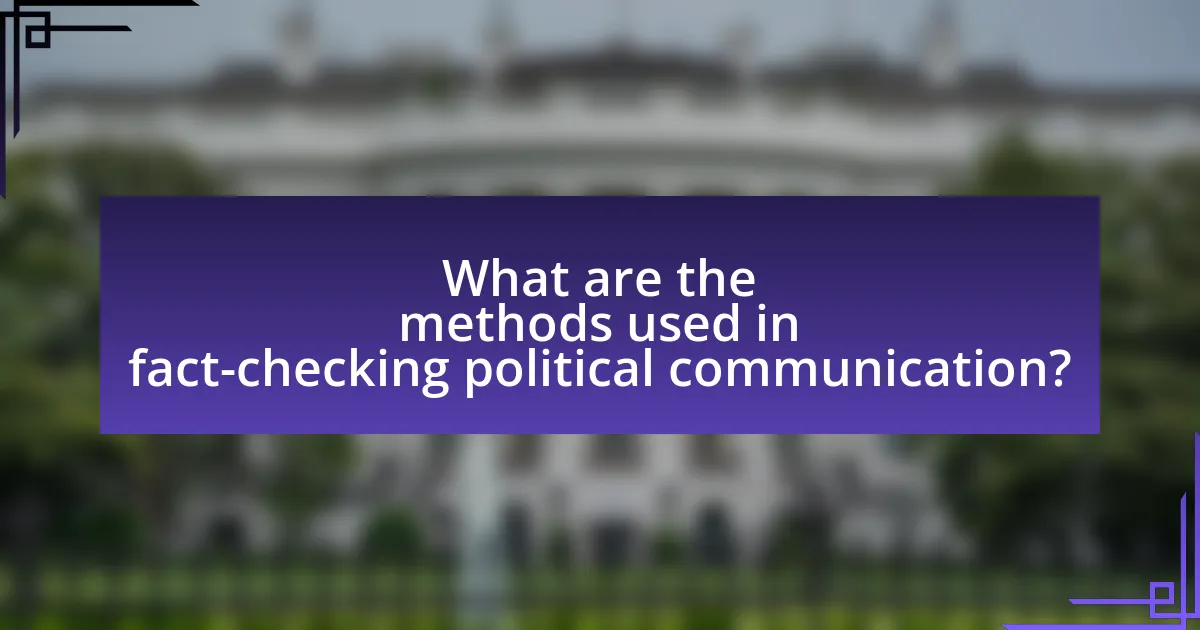
What are the methods used in fact-checking political communication?
The methods used in fact-checking political communication include source verification, cross-referencing claims with credible databases, and employing expert analysis. Source verification involves assessing the credibility of the information’s origin, ensuring that it comes from reliable and authoritative sources. Cross-referencing claims with databases like PolitiFact or FactCheck.org allows fact-checkers to compare statements against established facts and previous rulings. Expert analysis often involves consulting specialists in relevant fields to evaluate the accuracy of complex claims, particularly those involving technical or scientific information. These methods collectively enhance the reliability and accuracy of fact-checking in political discourse.
How do fact-checkers verify claims made by politicians?
Fact-checkers verify claims made by politicians through a systematic process that includes researching the claim, consulting reliable sources, and cross-referencing information. They begin by identifying the specific claim and its context, then gather evidence from credible sources such as official documents, expert opinions, and statistical data. For instance, organizations like PolitiFact and FactCheck.org utilize databases and archives to validate statements against established facts. This method ensures that the verification process is transparent and based on factual accuracy, allowing the public to understand the basis of the fact-checking outcome.
What sources do fact-checkers rely on for accurate information?
Fact-checkers rely on a variety of credible sources for accurate information, including primary documents, official statements, expert interviews, and reputable databases. Primary documents such as government reports and legal texts provide foundational evidence, while official statements from public figures can clarify claims. Expert interviews offer insights from knowledgeable individuals in relevant fields, and reputable databases, like academic journals and fact-checking organizations, serve as reliable repositories of verified information. These sources are essential for ensuring the accuracy and reliability of the fact-checking process, as they help to substantiate claims with concrete evidence.
How do fact-checkers assess the credibility of sources?
Fact-checkers assess the credibility of sources by evaluating several key criteria, including the source’s expertise, reputation, and the evidence provided. They analyze the author’s qualifications, the publication’s history, and whether the information is corroborated by other reliable sources. For instance, a study by the American Press Institute highlights that fact-checkers prioritize sources with established credibility, such as academic institutions or recognized news organizations, as these entities typically adhere to rigorous editorial standards. Additionally, fact-checkers often check for bias and the context in which the information is presented, ensuring that the source’s claims are not taken out of context or misrepresented.
What technologies are utilized in the fact-checking process?
The technologies utilized in the fact-checking process include natural language processing (NLP), machine learning algorithms, and automated fact-checking tools. NLP enables the analysis of text to identify claims that require verification, while machine learning algorithms help in categorizing and assessing the credibility of sources. Automated fact-checking tools, such as ClaimBuster and FactCheck.org’s API, streamline the verification process by cross-referencing claims against established databases and sources, enhancing efficiency and accuracy in identifying misinformation.
How do automated tools assist in fact-checking?
Automated tools assist in fact-checking by rapidly analyzing large volumes of data to identify misinformation and verify claims. These tools utilize algorithms and machine learning to cross-reference statements with reliable databases, such as fact-checking websites and academic sources, ensuring accuracy. For instance, tools like ClaimBuster and FactCheck.org’s API can evaluate the veracity of political statements in real-time, significantly reducing the time required for manual verification. Studies have shown that automated fact-checking can increase the efficiency of the fact-checking process by up to 80%, allowing journalists and researchers to focus on more complex analyses and contextual evaluations.
What role does social media play in the dissemination of fact-checked information?
Social media serves as a critical platform for the dissemination of fact-checked information by enabling rapid sharing and broad reach among users. It facilitates the immediate distribution of verified content, allowing fact-checking organizations to engage with audiences directly and counter misinformation effectively. For instance, a study by the Pew Research Center found that 64% of Americans use social media to access news, highlighting its significance in shaping public understanding. Additionally, platforms like Facebook and Twitter have implemented features that promote fact-checked articles, further enhancing their visibility and credibility.
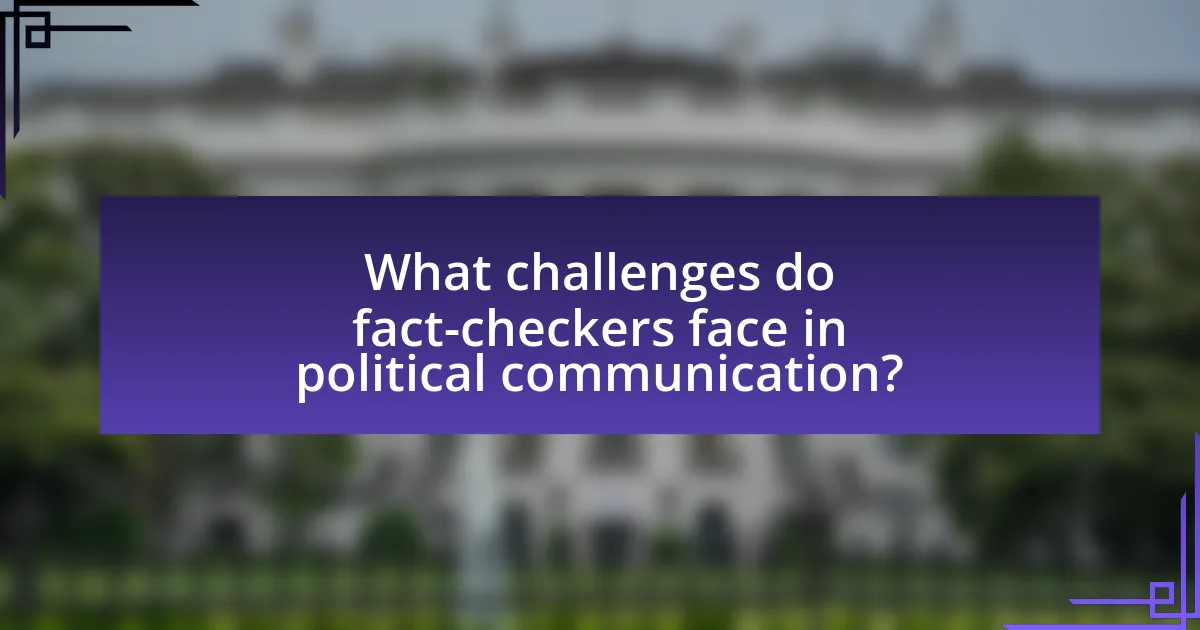
What challenges do fact-checkers face in political communication?
Fact-checkers face significant challenges in political communication, primarily due to the rapid spread of misinformation and the polarized media landscape. The speed at which false information circulates, especially on social media platforms, complicates the verification process, as fact-checkers must work quickly to counteract misleading claims before they gain traction. Additionally, the increasing partisanship in media sources often leads to biased interpretations of facts, making it difficult for fact-checkers to maintain objectivity and credibility. According to a 2020 study by the Pew Research Center, 64% of Americans believe that misinformation is a major problem in political discourse, highlighting the urgency and difficulty fact-checkers encounter in their efforts to provide accurate information.
How do biases affect the fact-checking process?
Biases significantly affect the fact-checking process by influencing the selection of claims to verify and the interpretation of evidence. Fact-checkers may prioritize information that aligns with their own beliefs or the beliefs of their audience, leading to selective scrutiny of certain claims while ignoring others. Research indicates that confirmation bias can result in fact-checkers favoring sources that support their pre-existing views, which undermines the objectivity essential for accurate verification. For instance, a study published in the journal “Political Communication” found that fact-checkers’ political affiliations can shape their assessments, impacting the perceived credibility of the claims they evaluate. This bias can ultimately distort public understanding and trust in the fact-checking process.
What strategies can fact-checkers use to minimize bias?
Fact-checkers can minimize bias by employing a systematic approach that includes using diverse sources, adhering to transparent methodologies, and engaging in peer review. By consulting a wide range of credible sources, fact-checkers can ensure a balanced perspective, reducing the likelihood of favoring one viewpoint over another. Transparency in their methodologies allows audiences to understand how conclusions are drawn, fostering trust and accountability. Additionally, peer review processes can help identify potential biases before publication, as other experts can provide critical feedback and alternative viewpoints. These strategies are supported by research indicating that diverse sourcing and transparency significantly enhance the credibility of fact-checking efforts, as demonstrated in studies conducted by the American Press Institute.
How do political pressures influence fact-checking outcomes?
Political pressures significantly influence fact-checking outcomes by shaping the priorities and methodologies of fact-checking organizations. These organizations may face external pressures from political entities, which can lead to biased evaluations or selective reporting of facts. For instance, during election cycles, fact-checkers may experience increased scrutiny from political parties and their supporters, potentially affecting their independence and objectivity. Research by the Pew Research Center indicates that fact-checking organizations often align their focus with the narratives prevalent in political discourse, which can skew the representation of facts based on the prevailing political climate. This alignment can result in a disproportionate emphasis on certain claims over others, ultimately impacting public perception and trust in the fact-checking process.
What are the limitations of fact-checking in political communication?
Fact-checking in political communication has several limitations, including the potential for bias, the challenge of context, and the speed of information dissemination. Bias can occur when fact-checkers have their own political leanings, which may influence their evaluations of claims. Additionally, the context in which statements are made can significantly alter their meaning, making it difficult for fact-checkers to assess accuracy without comprehensive background information. Furthermore, the rapid spread of misinformation on social media often outpaces the fact-checking process, rendering some fact-checks ineffective by the time they are published. These limitations highlight the complexities involved in ensuring accurate political communication.
How can fact-checking be misinterpreted by the public?
Fact-checking can be misinterpreted by the public when individuals perceive it as biased or selective, leading to skepticism about its credibility. This misinterpretation often arises from the framing of fact-checks, where the language used may suggest a particular political stance, causing audiences to question the objectivity of the fact-checking process. For instance, a study by the Pew Research Center found that 62% of Americans believe fact-checking organizations have a political bias, which can undermine trust in their findings. Additionally, when fact-checks are presented without sufficient context, the public may misunderstand the nuances of the claims being evaluated, resulting in oversimplified conclusions.
What are the consequences of incomplete fact-checking?
Incomplete fact-checking can lead to the spread of misinformation, which undermines public trust in media and institutions. When fact-checking is not thorough, inaccuracies can propagate, influencing public opinion and potentially swaying electoral outcomes. For instance, a study by the Pew Research Center found that 64% of Americans believe that misinformation has a significant impact on political discourse. Additionally, incomplete fact-checking can result in the reinforcement of false narratives, as seen in various political campaigns where misleading claims were not adequately addressed, leading to confusion among voters.
What best practices can enhance the effectiveness of fact-checking?
Best practices that can enhance the effectiveness of fact-checking include establishing clear criteria for evaluating claims, utilizing reliable sources, and maintaining transparency in the fact-checking process. Clear criteria help fact-checkers systematically assess the accuracy of statements, while reliable sources ensure that the information is credible and verifiable. Transparency, such as disclosing methodologies and sources, builds trust with the audience and allows for scrutiny of the fact-checking process. Research indicates that organizations adhering to these practices, like PolitiFact and FactCheck.org, demonstrate higher accuracy and credibility in their assessments, thereby improving public trust in fact-checking efforts.
How can fact-checkers improve their communication with the public?
Fact-checkers can improve their communication with the public by utilizing clear, concise language and engaging formats such as infographics and videos. This approach enhances understanding and retention of information, as studies show that visual content can increase engagement by up to 94%. Additionally, fact-checkers should actively engage with their audience through social media platforms, responding to questions and clarifying misconceptions in real-time. Research indicates that interactive communication fosters trust and credibility, essential components in the realm of political discourse. By prioritizing transparency in their methodologies and providing sources for their claims, fact-checkers can further establish authority and reliability, which is crucial in combating misinformation.
What role does collaboration among fact-checkers play in enhancing credibility?
Collaboration among fact-checkers significantly enhances credibility by pooling resources, expertise, and information to verify claims more effectively. When fact-checkers work together, they can cross-reference data, share methodologies, and develop standardized criteria for evaluating information, which leads to more accurate and reliable assessments. For instance, initiatives like the International Fact-Checking Network (IFCN) promote collaboration among various fact-checking organizations, resulting in a collective effort to uphold journalistic integrity and combat misinformation. This collaborative approach not only increases the accuracy of fact-checking but also fosters public trust, as audiences are more likely to believe in the credibility of information that has undergone rigorous scrutiny by multiple independent sources.
